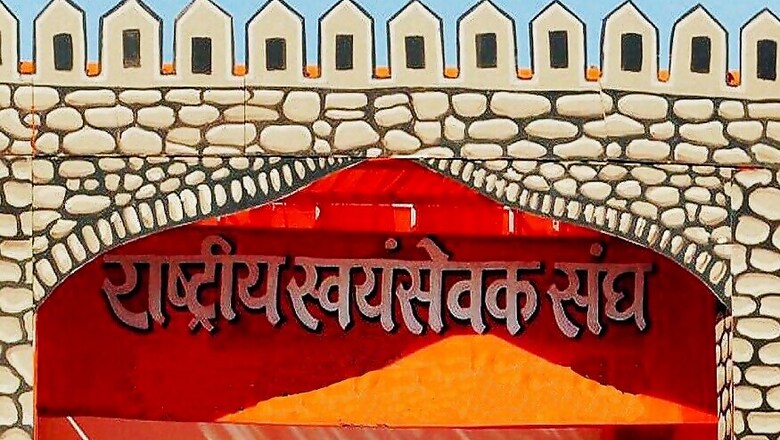
views
I was very young when the Emergency was clamped on June 25, 1975. Born into a he family of swayamsewaks, I was the youngest to attend an RSS shakha. My father being the eldest among siblings, his brother and my brother were the other members of Sangh in the family. The proclamation of Emergency is etched in the memory also because the school where I used to study was shut down.
I still remember three or four other swayamsewaks along with my elder brother came back to our house carrying a football late evening and said that my uncle had been arrested and taken to the nearest police station for taking part in a “lookalike” RSS shakha. He was a government teacher and was supervising other kids playing football.
Immediately after the proclamation of Emergency, the RSS was banned. This was followed by advice from government that employees who are found to have connections with banned organisations were liable to be dealt with suitably under departmental proceedings and appropriate action should be taken against them.
With regard to banned organisations, it was seen that persons were detained mostly on vague police reports saying that they were connected with the RSS. During the period of emergency, 25,962 public servant and employees in the public sector undertaking were prematurely retired.
The Maintenance of Internal Security Act (MISA) was passed by the Parliament in 1971. After the proclamation of emergency, MISA was heavily used against political opponents. Scrutiny of cases of detention under MISA has revealed that in a majority of states, a large number of persons belonging to the opposition political parties were detained on ground of alleged participation in secret meetings in which imposition of emergency and government policy were criticised.
RSS Sarsanghchalak Balasaheb Deoras was arrested at Nagpur station on June 30, 1975. He gave a call before his arrest: "In this extraordinary situation, the volunteers have an obligation not to lose their balance. Continue the Sangh work as per the orders of Sarkaryavah Madhavrao Mule and build the ability of the public to perform their national duty while doing public relations, public awareness and public education as necessary.”
All kinds of communication platforms, such as newspapers, magazines, forums, postal service and elected legislatures, were stopped. The question was: who should organise the mass movement in this situation? No one else could do it except the RSS, which had its own network of branches across the country and could play this role.
The Sangh has built itself from the beginning through people-to-people contact. He never relied on press or forum for public relations. So the effect of stopping the media had an impact on other parties, but it did not have even a minor impact on the Sangh. Its central decisions at the all-India level reach the village through the levels of the province, department, district and tehsil. This communication system ran smoothly from when the Emergency was announced and the Emergency. The house of Sangh activists proved to be the greatest boon for taunting the underground movement and due to this, the intelligence officers could not find the whereabouts of underground workers.
The 'Lok Sangharsh Samiti' was formed and Nanaji Deshmukh was appointed its convener. Once he got arrested, Sunder Singh Bhandari took his place. Out of a total of 1,30,000 Satyagrahis who performed Satyagraha under its banner during the Emergency, more than 100,000 were from the RSS. Of the 30,000 people held captive under MISA, more than 25,000 belonged to the Sangh.
Rajender Singh, popularly known as Rajju Bhaiyya (then Jt General Seceratry RSS), went underground and toured all of India. Singh was also responsible for organising human rights convention presided by Justice VM Tarkunnde in Delhi in 1976. He was also responsible for setting up Friends of India Society International.
The RSS played a major role against the draconian emergency.
“The underground campaign against Mrs Gandhi claims to be the only non-left wing revolutionary force in the world, disavowing both bloodshed and class struggle. Indeed, it might even be called right wing since it is dominated by the Hindu communalist party, Jan Sangh and its ‘cultural’ (some say paramilitary) affiliate the RSS. But its platform at the moment has only one non-ideological plank; to bring democracy back to India. The ground troops of this operation (the underground movement), consist of tens of thousands of cadres who are organized to the village level into four men cells. Most of them are RSS regulars, though more and more new young recruits are coming in. The other underground parties which started out as partners in the underground have effectively abandoned the field to Jan Sangh and RSS,” wrote The Economist on December 12, 1976.
Achyut Patwardhan wrote, "I am pleased to learn that Rashtriya Swayamsevak Sangh activists work with any other group of political resistance, with zeal and loyalty, and vampiric regime that resorts to extreme repression and lies. Those who were opposing emergency, the swayamsewaks were ready to cooperate with them openly. The courage and valor with which the Swayamsewaks were carrying out the movement in the face of the atrocities of the police, the communist member of the parliament - Shri AK Gopalan - was also shocked. He had said, "There is some high ideal that is giving them indomitable courage for such heroic work and sacrifice."
The RSS inspired newspapers and magazines played a major role during emergency. This was the reasons many such magazines and newspapers had to face the wrath of the government. Few of such titles are Panchajanya, Organiser, Motherland, Tarun Bharat, Vivek, Vikram, Rashtradharm, Yugdharm.
The editor of Motherland and Organiser, KR Malkani, was the first journalist to be arrested during emergency and he remained in jail till the end of emergency. He wrote, “Motherland was the only newspaper in the country which in its edition published on 26 June not only informed people about emergency but also about arrest and protest at national level against emergency.”
He further wrote that the electricity of the Motherland office situated at Jhansi road, Jhandewalan, New Delhi, faced a power cut though there was electricity t at neighbouring office ‘Janyug’, the communist mouthpiece. Those who are lecturing today on “Freedom of Expression” should know the cost this freedom. And there is no other better organisation than RSS to learn from.



















Comments
0 comment